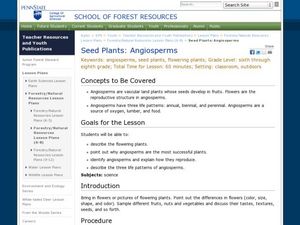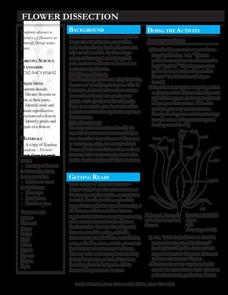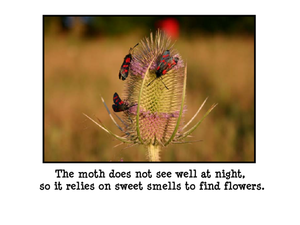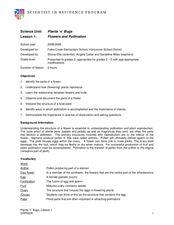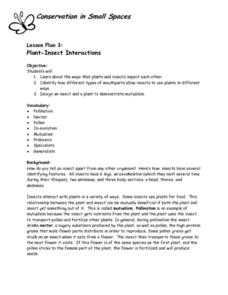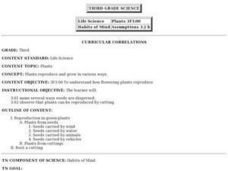Curated OER
How Do Flowering Plants Reproduce
Students investigate how flowering plants reproduce. They identify and describe the functions of the major sexual organs of a flower and fruit by examining and dissecting flowers and fruit.
Curated OER
Plant Parts and their Function
Discover why plants are important to our world. View plant parts and categorize them as stems or buds. Students do a cut and paste of pictures of plants into correct categories. Students also plant a carrot top,and record...
Curated OER
Seed Plants: Angiosperms
Students describe flowering plants and see why angiosperms are the most successful plants. In this angiosperms lesson students identify angiosperms and explain how they reproduce.
Curated OER
Flower Dissection
Beginning biologists pull a flower apart and familiarize themselves with the different reproductive structures. Why have them learn only from just a book or diagram when they can examine real samples? There is no link to the referenced...
Curated OER
Creating a Pollinator Garden
Students build a pollination garden. In this pollination lesson, students read directions and build a pollinator garden that will produce flowering plants for pollinator organisms to use in pollination of other plants.
Curated OER
How Do Flowering Plants Reproduce?
Sixth graders learn the parts and function of flowering plants.
Curated OER
Flower Power
Students explore the parts of flowers and how they reproduce. They dissect flowers and observe the reproductive organs. Students observe anthers and ovaries of Tiger Lilies under a microscope. They investigate how insects and other...
Curated OER
Parts of the Flower and Pollination
Students review the parts of the plant and recognize the parts that are important for pollination. For this pollination lesson, students illustrate and label the parts of a flower. Students compare different types of flowers.
Curated OER
Flower Power
Young scholars explore parts of the flower. In this plant biology lesson, students dissect flowers and identify how the seeds are formed. Young scholars take a nature walk to pick flowers for future dissections.
Curated OER
PLANT LIFE CYCLES
Student learns about the life cycle of plants by watching a time-lapse video. This activity provides young scholars with further evidence that all living things grow and change as they progress through their life cycle. Student conducts...
Curated OER
Smarty Plants
Students examine plants and pollinators. For this plant biology lesson, students read The Power of Pollinators and identify the parts of the plant and the pollinators. Students design their own imaginary plants.
Curated OER
Pollination of Flowers by Moths
Turn your classroom into a pollination station as your kids transform into moths or predators trying to survive and aiding in plant reproduction along the way. Using silent party blowers as proboscises, the moths will have two minutes to...
Curated OER
Flower Reproduction
Fifth graders examine the cycle of flower reproduction. They listen to a poem about a bee, observe and examine flowers in small groups, and develop a class KWL chart. Students then read about flower reproduction in their textbook, and...
Curated OER
A Hidden Beauty
Expose the beautiful mystery of bulbs as young botanists learn all about these fascinating plants. They glean information from a short text before observing actual bulbs (consider an onion), and comparing their findings with predictions....
Curated OER
Flowers and Pollination
Students explore the environment by researching plant reproduction. In this pollination instructional activity, students define botany related vocabulary terms such as disc flower, petal and fertilization. Students dissect a flower with...
Curated OER
Plants 1: Plant Parents
Students review their prior knowledge on plants. In groups, they compare and contrast the difference between reproducing asexually and sexually. Using the internet, they research how some plants can be forced to produce asexually.
Curated OER
Conservation in Small Spaces: Plant-Insect Interactions
Learners explore ways that plants and insects impact each other, identify how different types of mouthparts allow insects to use plants in different ways, and design an insect and a plant to demonstrate mutualism.
Curated OER
Flowering Phenology: How Do Plants Know When to Flower?
Students study the process of plant reproduction and the biotic and abiotic factors that affect flowering phenology. In this plant reproduction activity, students describe the interaction of environmental factors as it relates to...
Curated OER
Lesson 3: Life Cycle of Brassica Plants
Students investigate the life cycle of brassica plants. In this science lesson, students observe each stage in the life cycle of their plant. Students record their observations and graph the data. Students
Curated OER
PLANT LIFE CYCLES
Student learns about the life cycle of plants by watching a time-lapse video. This activity provides students with further evidence that all living things grow and change as they progress through their life cycle.
Curated OER
Plants 1: Plant Parents
Pupils explain that most plants usually reproduce sexually. They learn the parts of the flower and the process of sexual reproduction in plants.
Chicago Botanic Garden
Plant Phenology Data Analysis
Scientists monitor seasonal changes in plants to better understand their responses to climate change, in turn allowing them to make predictions regarding the future. The last activity in the series of six has scholars analyze BudBurst...
Curated OER
Fun with Plants Flower Power
Students understand the parts of the flower. In this flower lesson, students perform experiments to see where seeds come from. Students complete a data sheet about the experiment. Students understand the terms pistil and stamen.
Curated OER
Plants Reproduce and Grow in Various Ways
Third graders take a walk around the outside of the school and examine their clothing to see if they picked up any seeds while on their walk. They discuss how seeds travel and how a new plant thus can form. They then observe root...




